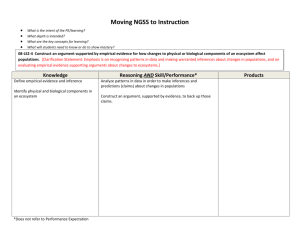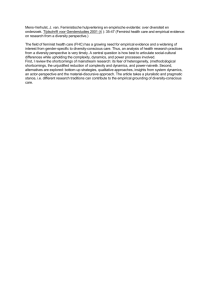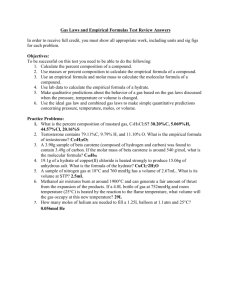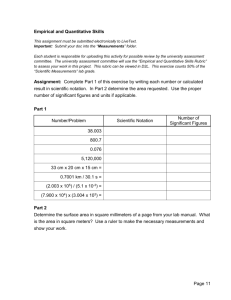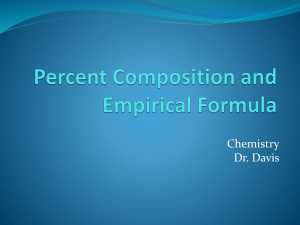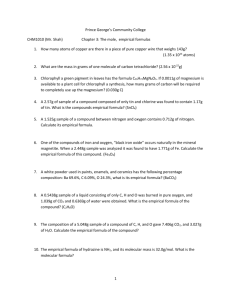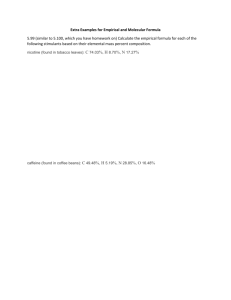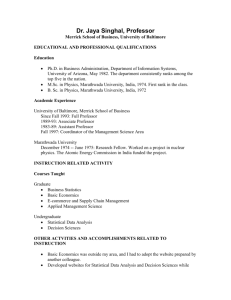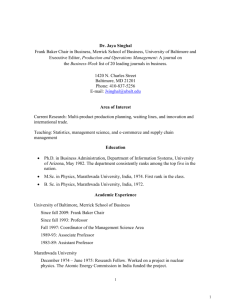Producing and Publishing Empirical Research in Operations
advertisement
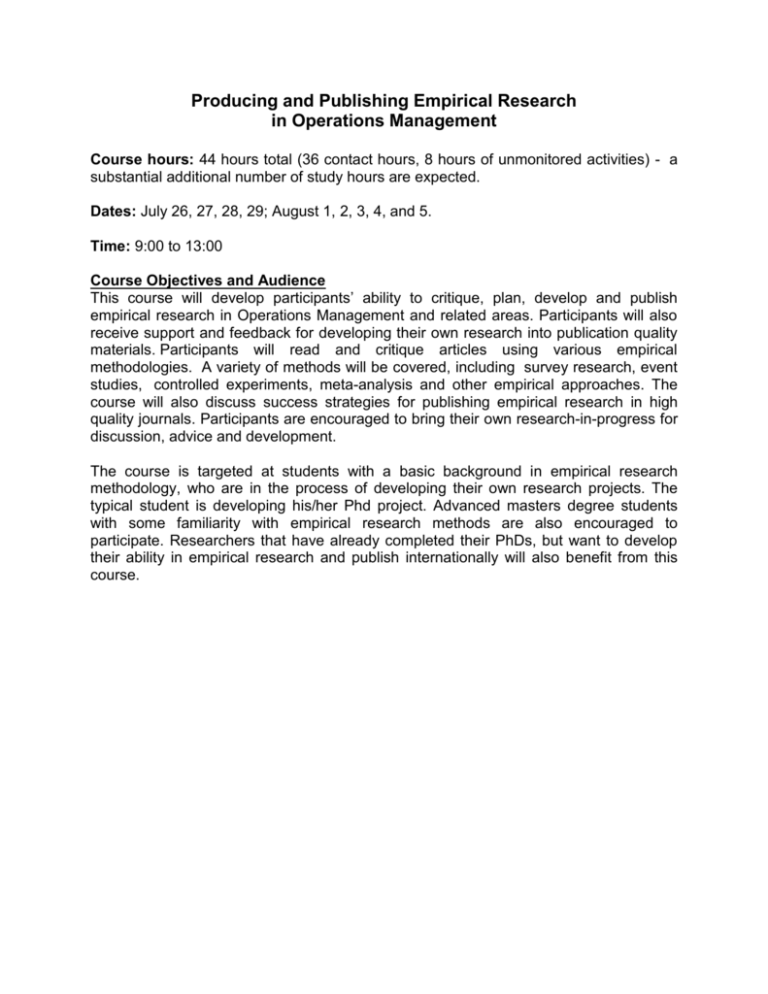
Producing and Publishing Empirical Research in Operations Management Course hours: 44 hours total (36 contact hours, 8 hours of unmonitored activities) - a substantial additional number of study hours are expected. Dates: July 26, 27, 28, 29; August 1, 2, 3, 4, and 5. Time: 9:00 to 13:00 Course Objectives and Audience This course will develop participants’ ability to critique, plan, develop and publish empirical research in Operations Management and related areas. Participants will also receive support and feedback for developing their own research into publication quality materials. Participants will read and critique articles using various empirical methodologies. A variety of methods will be covered, including survey research, event studies, controlled experiments, meta-analysis and other empirical approaches. The course will also discuss success strategies for publishing empirical research in high quality journals. Participants are encouraged to bring their own research-in-progress for discussion, advice and development. The course is targeted at students with a basic background in empirical research methodology, who are in the process of developing their own research projects. The typical student is developing his/her Phd project. Advanced masters degree students with some familiarity with empirical research methods are also encouraged to participate. Researchers that have already completed their PhDs, but want to develop their ability in empirical research and publish internationally will also benefit from this course. Date July 26 Topic Survey Research July 27 Survey Research July 28 Event Study Research July 29 Case Research Reading Ferdows, K. & De Meyer, A., Lasting improvements in manufacturing performance: in search of a new theory. Journal of Operations Management, 1990, 9(2), 168-184. Benson, P.G.,Saraph, J.V. & Schroeder, R.G., The effects of organizational context on quality management: an empirical investigation. Management Science, 1991, 37(9), 1107-1124. Anderson, J.C., Rungtusanatham, M., Schroeder, R.G. & Deveraj, S., A path analytic model of a theory of quality management underlying the Deming management method: preliminary empirical findings. Decision Sciences, 1995, 26(5), 637-658. Terziovski, M., Sohal, A. & Moss, S., Longitudinal analysis of quality management practices in Australian organizations. Total Quality Management, 1999, 10(6), 915-926. Peng, D.X., Schroeder, R.G. & Shah, R., Linking routines to operations capabilities: a new perspective. Journal of Operations Management, 2008, 26, 730-748. Huo, B.,Selen, W., Yeung, J.H.Y. & Zhao, X., Understanding drivers of performance in the 3PL industry in Hong Kong. International Journal of Operations and Production Management, 2008, 28(8), 772-800. Liu, Y., Luo, Y. & Liu, T., Governing buyer-supplier relationships through transactional and relational mechanisms: evidence from China. Journal of Operations Management, 2009, 27, 294-309. Kull, T.J. & Wacker, J.G., Quality management effectiveness in Asia: the influence of culture. Journal of Operations Management, 2010, 28, 223-239. Hendricks, K.B., Singhal, V.R. & Wiedman, C.I., The impact of capacity expansion on the market value of the firm. Journal of Operations Management, 1995, 12, 259-272. Hendricks, K.B. & Singhal, V.R., Delays in new product introductions and the market value of the firm: The consequences of being late to the market. Management Science, 1997, 43(4), 422-436. Corbett, C.J., Montes-Sancho, M.J. & Kirsch, D.A., The financial impact of ISO 9000 certification in the United States: An empirical analysis. Management Science, 2005, 51(7), 1046-1059. Hendricks, K.B. & Singhal, V.R., Association between supply chain glitches and operating performance. Management Science, 2005, 51(5), 695-711. Brown, S.L. & Eisenhardt, K.M., The art of continuous change: linking complexity theory and time-paced evolution in relentlessly shifting organizations. Administrative Science Quarterly, 1997, 42, 1-34. Pagell, M., Understanding the factors that enable and inhibit the integration of operations, purchasing and logistics. Journal of Operations Management, 2004, 22, 459-487. Wu, Z. & Choi, T.Y., Supplier-supplier relationships in the buyer-supplier triad: Building theories from eight August 1 Controlled Experiments August 2 Meta-Analysis August 3 Mock Review Presentations August 4 Ask the Experts Panel Discussion August 5 Proposal Presentations case studies. Journal of Operations Management, 2005, 24, 27-52. Lockström, M., Schadel, J., Harrison, N., Moser, R. & Malhotra, M.K., Antecedents to supplier integration in the automotive industry: A multiple-case study of foreign subsidiaries in China. Journal of Operations Management, 2010, 28, 240-256. Qualls, W.J. & Puto, C.P., Organizational climate and decision framing: An integrated approach to analyzing industrial buying decisions. Journal of Marketing Research, 1989, 26, 179-192. Hui, M.K, Zhao, X., Fan, X. & Zu, K., When does the service process matter? A test of two competing theories. Journal of Consumer Research, 2004, 31, 465-475. Mantel, S.P., Tatikonda, M.V. & Liao, Y., A behavioral study of supply manager decision-making: Factors influencing make versus buy evaluation. Journal of Operations Management, 2006, 24, 822-838. Bendoly, E., Bachrach, D.G., Wang, H. & Zhang, S., ERP in the minds of supervisors: Joint roles of task interdependence and cultural norms. International Journal of Operations & Production Management, 2006, 26(5), 558-578. Nair,A., Meta-analysis of the relationship between quality management practices and firm performance – implications for quality management theory development. Journal of Operations Management, 2006, 24, 948-975. Chen, J., Damanpour, F. & Reilly, R.R., Understanding antecedents of new product development speed: A meta-analysis. Journal of Operations Management, 2010, 28, 17-33. Mackelprang, A.W. & Nair, A., Relationship between just-in-time manufacturing practices and performance: A meta-analytic investigation. Journal of Operations Management, 2010, 28, 283-302. Rosenzweig, E.D. & Easton, G.S., Tradeoffs in manufacturing? A meta-analysis and critique of the literature. Production and Operations Management, 2009, 19(2), 127-141. Groups of students will be provided with a draft that has been submitted to a journal, along with reviewing forms for that journal. Each group will be responsible for developing a written review and presenting a summary of the article and their review during class. Students will have the opportunity to interact with a panel of journal editors and other experts via Skype. Each expert will make a brief presentation about their background and journal, followed by open discussion and questions. Each student will prepare a written proposal for a research paper. During this workshop session, each student will present his or her proposal, and the class will have the opportunity to provide developmental feedback.

